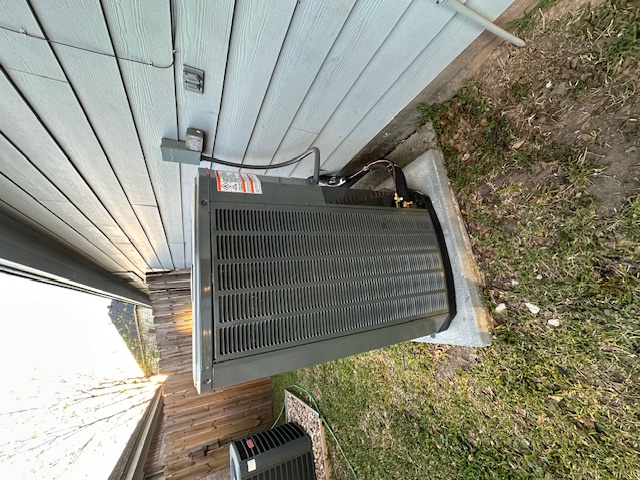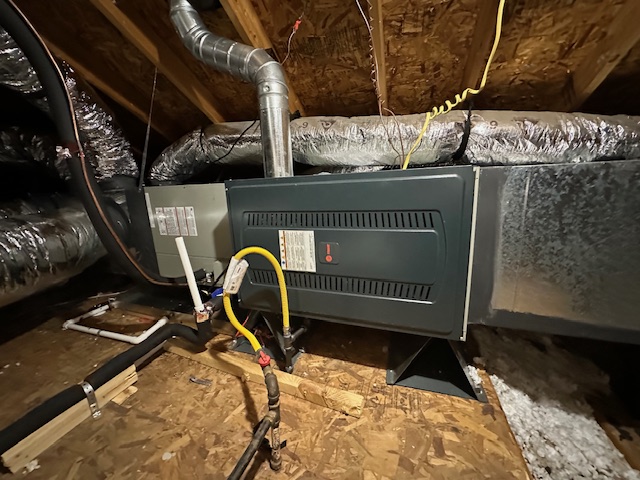Air conditioning units are a vital part of many homes and businesses but how long can we expect these systems to last before needing replacement?
The typical lifespan of a central air conditioning unit is 10 to 15 years with proper care and maintenance. Window units tend to have a shorter life, lasting about 8 to 10 years on average, and these numbers can vary based on usage, climate, and upkeep.
Regular cleaning, prompt repairs, and yearly professional check-ups are all key to extending an air conditioner's useful life.
This guide covers how long each type of AC typically lasts, what factors shorten or extend their lifespan, and when it's time to consider an upgrade, so you can make smart, cost-effective decisions about your cooling system.
Here's what you'll learn:
- How long do air conditioning units last?
- How does maintenance affect AC unit lifespan?
- What are the warning signs your AC unit is failing?
- When should you replace your air conditioning unit?
- Cost to replace different types of AC units
Let's dive in!
How long do air conditioning units last?
Air conditioners can last for varying lengths of time depending on several key factors and vary between central AC, window units, and other systems.
What factors affect air conditioner lifespan?
Regular maintenance is crucial for AC longevity, including annual professional inspections and regularly cleaning or replacing air filters. Usage patterns affect lifespan too and units that run all day in hot climates wear out faster than those used less often.
The quality of the initial installation matters a lot as a poorly installed AC won't work correctly and can break down sooner. Proper sizing is also key - an oversized unit cycles on and off too much, while an undersized one works too hard.
How climate affects AC unit lifespan
In hot, humid regions like Texas or Florida, systems run almost year-round, which increases wear and shortens lifespan. In contrast, homes in milder climates such as the Pacific Northwest may use AC less frequently, allowing units to last longer.
Coastal environments pose additional risks due to salt exposure, which accelerates corrosion, especially on outdoor condenser coils. Regular cleaning and protective coatings can help mitigate this damage.
Signs of poor AC installation and its impact on lifespan
A poorly installed AC system can fail years earlier than expected. Common signs of bad installation include uneven cooling, noisy operation, short cycling, and unusually high energy bills.
These issues often stem from improper refrigerant charging, incorrect duct sizing, or poor airflow setup.
When systems are not matched to the home’s layout or cooling load, components are forced to work harder, reducing efficiency and increasing the chance of early failure. Always ensure installation is handled by licensed professionals who perform a proper load calculation.
How long do different types of AC units last?
- Central AC systems typically last 15-20 years with good care. They're built for whole-home cooling and can handle heavy use.
- Window units have a shorter life of 8-10 years. They're less durable but also cheaper to replace.
- Mini-split systems fall in between, lasting about 10-15 years. They're more efficient than window units and easier to install than central AC.
- Air-source heat pumps, which heat and cool, usually last 10-15 years.
- Ductless mini-splits can last up to 20 years. They're very efficient and don't lose cooling through ducts. The outdoor unit might need replacing before the indoor units do.
How does maintenance affect AC unit lifespan?
Regular maintenance is key to keeping air conditioners running well for many years and maintaining maximum performance.
Why is regular AC maintenance important?
Regular AC maintenance can add years to your unit's life and we recommend scheduling annual service calls with an HVAC technician. Professionals can spot and fix issues early on and prevent bigger breakdowns that could shorten your AC's lifespan.
Well-maintained ACs also use less energy, saving money on electric bills. Plus, a clean system cools your home better so you'll feel more comfortable without working the AC as hard, and prevents the AC from emitting air that is too warm, or too freezing.
Skipping maintenance can lead to more repairs and make your AC wear out faster. In the long run, good upkeep saves both time and money.
What AC maintenance tasks should you do regularly?
- Regularly clean or replace air filters
- Clean outdoor unit of debris
- Check thermostat settings
- Clear drain lines
- Clean evaporator and condenser coils
- Check refrigerant levels
For more complex jobs, call a technician as they have the tools and know-how for deep cleaning and AC troubleshooting.
What are the warning signs your AC unit is failing?
Air conditioning units often show signs of trouble before they stop working completely. Key warning signals to watch for include unusual noises and the effects of humidity.
Recognizing frequent breakdowns and unusual noises
Frequent repairs are a red flag for AC units. If you’re calling for a service more than once or twice a year, it may be time for a replacement. Unusual noises are another concern, and banging, grinding, or squealing sounds can mean serious problems.
Pay attention to how often the unit turns on and off, this is known as short cycling and it wastes energy and can wear out parts faster. Strange smells coming from the AC are also a worry. Musty odors might mean mold growth while burning smells could indicate electrical issues.
How do humidity and corrosion damage AC units?
High humidity in homes can signal that the AC isn't doing its job and a properly functioning unit should remove excess moisture from the air. Uneven cooling throughout the house is another sign of trouble and some rooms might feel too warm while others are too cold.
Corrosion on AC components is a serious issue and can lead to refrigerant leaks and system failure. Visible rust or water stains around the unit are also clear signs of damage and these issues can quickly worsen if not addressed quickly.
When should you replace your air conditioning unit?
AC replacement can be a big decision so you need to carefully decide if it’s time for an upgrade or whether it’s worth investing in an energy-efficient option.
What are the signs it’s time to replace your AC unit?
Old air conditioners often need more repairs and if your AC is over 10 years old and frequently breaks down, it may be time for a new one. Some ACs also use R-22 coolant, which is being phased out. If yours relies on R-22, a replacement may be the best choice.
High energy bills can also signal the need for replacement as newer models use less power and can cut cooling costs. Strange noises or weak airflow points to AC problems and these issues might mean it's time to upgrade your cooling system.
What are the best energy-efficient AC upgrade options?
Energy-efficient ACs can save money on bills, especially units with high Seasonal Energy Efficiency Ratio ratings. Smart thermostats can boost efficiency further by learning your habits and adjusting temperatures automatically. Before purchasing, ask about rebates and tax credits as many areas offer rewards for buying energy-efficient ACs.
You could also consider a heat pump for both heating and cooling as they work well in mild climates and can be very efficient.
If you’re replacing your AC or making major upgrades, consider a HERS test to evaluate duct efficiency and system performance, this can identify energy losses and help ensure your new unit operates at peak efficiency.
Cost to replace different types of AC units
Replacing an air conditioning unit in 2025 typically costs between $3,906 and $8,020, with an average expense of $5,959. The final price depends on factors like unit size, type, and installation complexity, according to Angi's article "How Much Does AC Replacement Cost in 2025?"
- Central AC units cost around $5,000–$7,500, including ductwork adjustments.
- Ductless mini-splits range from $2,000 to $7,000 depending on the number of zones.
- Window units are the most affordable, typically $150 to $750, but often replaced more frequently.
- Heat pumps used for both cooling and heating fall in the $4,500–$8,500 range.
Installation quality and local labor rates can impact final pricing. It’s important to compare multiple quotes and ensure the chosen system is properly sized for your home.
Conclusion
The average lifespan of air conditioning units ranges from 8 to 20 years depending on the system type, climate, and quality of maintenance. Central ACs and ductless mini-splits tend to last longer when properly installed and regularly serviced, while window units offer shorter-term cooling with quicker replacement cycles.
Recognizing the signs of wear, like frequent repairs, high energy bills, or inconsistent cooling, can help you act before a complete breakdown. If your AC is aging or inefficient, replacing it with an energy-efficient model can lower utility costs and improve comfort year-round.
A qualified HVAC professional can assess your current system and recommend the best next step based on your home, budget, and usage.
Get in touch to discuss your cooling needs and whether it’s time to upgrade.











